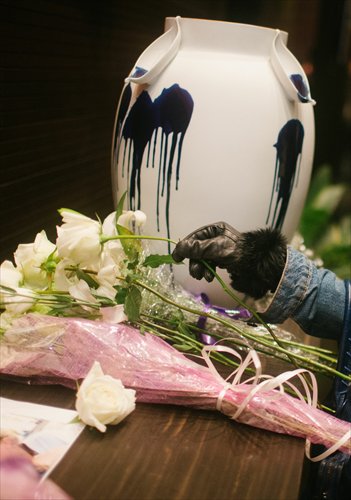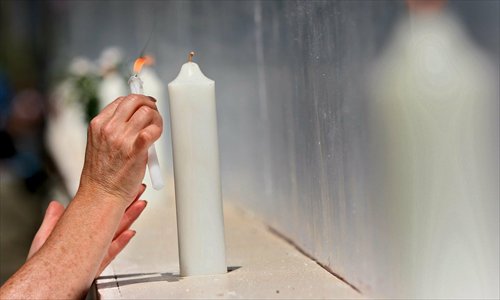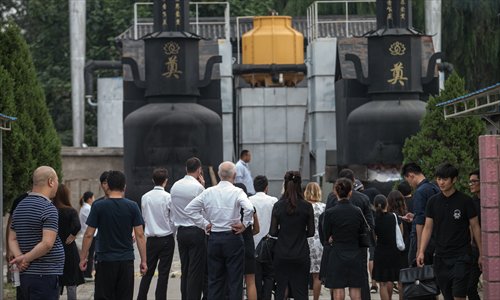When expats die in China, it can be a long way to their final resting place

A common belief of people from across the world is that eternal peace can only be achieved by burying the deceased in their country of birth. Photo: Li Hao/GT
If you ask 29-year-old American Simon (pseudonym) his saddest memory from his nearly eight years in China, he can tell you immediately - his friend's funeral seven years ago.
"Megan" was in her early 30s when she died suddenly from an asthma attack in Tianjin, where she and Simon both lived at the time. Though her friends organized a memorial of sorts in Tianjin, it lacked the usual trappings of a funeral - no minister, no family, no burial. That's because by the time Megan's friends in Tianjin were honoring her life, her remains were on their way back to her hometown in the US, where the official funeral would be held.
"It was a long way for her to get home from China," said Simon. "But all the efforts her family and friends made were to ensure that she could rest in peace forever in her own hometown."
China may be a beloved home for many expats, but few of them are likely to seek eternity here. As an old Chinese saying goes, "Fallen leaves return to their roots" - in other words, most people want to be buried in the place where they were born, or which they call home. It's something that people from all over the world can understand.

The industry related to repatriating the remains of foreigners has been developing fast in China. Photo: IC

A group of people attend a funeral at Babaoshan Revolutionary Cemetery. Photo: Li Hao/GT
The challenges of repatriating remains
No one plans on dying so far from home, but for some expats, it's an unavoidable reality.
Several months ago, Jacob (pseudonym), a 63-year-old Brit who works as a senior marketing consultant in Beijing, had a heart attack, causing his heart to stop for a time, before being pulled back from the brink of death. It was after that terrifying experience that he began to think about his life and "the eternity waiting for everyone."
"I never considered being buried in China," he says. "I'm alone here - I don't belong to this country."
It was a wakeup call for Jacob, who's always planned to return to his hometown, the city of Bath in Somerset, England, to be near his family.
"I don't know the details of transporting a body but I guess that it must be very troublesome and expensive. So I will try to return home while I am still alive, which is much more economical and will not scare the stewardesses," jokes Jacob, who plans to resign next year and go back home.
He's right about one thing - transporting bodies overseas is no easy task. Although some of the paperwork may be handled by the deceased's embassy, other matters require the help of third parties. "The embassy has to support the family with the practical elements of repatriation," Niamh Downey, a representative from the Embassy of Ireland, told the Global Times in 2012.
He said what they don't do, is pay for funerals or repatriation. The embassy only takes responsibility for the deceased if the next of kin can't be identified or located, or don't want to assume responsibility.
Dealing with repatriating foreigners who have died has become easier over the past 10 years or so, as China has seen the emergence of several funeral homes that specialize in foreign deaths. Among them is Roseates, which was opened in 2007 by Belgian Wilfried Verbruggen.
In addition to dealing with issues related to the remains - embalming or cremation, transportation, customs and so forth - they also take care of the paperwork, including death certificates, quarantine certificates, formalities with the Chinese and consular authorities, and transportation of personal effects. The company charges around 80,000 yuan ($12,288) to 90,000 yuan for the whole process.
"All kinds of costs, including transport, are going up, so repatriation is not becoming any cheaper," Verbruggen told the Global Times in 2012.
"Sometimes the quarantine authorities suddenly add an unforeseen fee or funeral parlors present an invoice for an obscure service."
He added that embalmment in Beijing can range anywhere from 10,000 and 15,000 yuan, almost double that in most Western countries.
Although a number of private businesses have sprung up in Beijing in recent years to deal with expat deaths, Roseates claims to be the only one recognized by the China Funeral Association, whose members are the only parties authorized to deal with the corpses of foreigners in China.
Founded in 1993, China Funeral Association has a network of 34 funeral parlors in 25 provincial administrative regions that transport the bodies of about 1,800 deceased foreigners each year. According to the official website of China's Ministry of Civil Affairs, that number was just 300 in the early 1990s.
Currently, the biggest causes of death among foreigners are heart attacks, alcohol poisoning and traffic accidents.
China's strict burial laws
What about those whose connections to their home countries have grown tenuous - those who've married into Chinese families or have no one waiting for them back home?
Jacob has pondered the question, and says that, for him, his everlasting resting place matters only in terms of its connection to his loved ones. "I think if I were alone for my whole life, it wouldn't matter for me if I had to remain in China after death," he said.
What he, and most other foreigners, don't know, is that it's well-nigh impossible for them to be buried in China even if they wanted to.
According to official procedures issued in 1995 governing the death of foreigners in China, there is no mechanism by which a foreigner who dies in China can be buried or have his or her ashes scattered on public lands. Instead, the procedure when a non-citizen dies on Chinese soil is for the embassy or consulate of the deceased to inform the relatives and ask how to deal with the body. There are two options for ordinary people; one is to directly transport the body back to the home country, and the other is to transport the ashes back after cremation.
Burial in China isn't an option - even for Chinese citizens. Following the nationwide launch of "Funeral Reform" in 1985, burials were officially banned in favor of cremation in an effort to conserve land. The only option for families who want a physical memorial for their loved ones are mausoleums or small cemetery plots where ashes can be buried.
For foreigners, the options are even slimmer. According to Chinese regulations, foreigners cannot have their ashes buried or scattered at public memorial sites, except for those who have distinguished themselves with their "special contributions."
One staff member from China's most illustrious national burial ground, Babaoshan Revolutionary Cemetery, said that only foreigners who made "great contributions or rank high in the government" can have their ashes interred in the cemetery.
"We don't accept requests from individuals for cremation and other funeral services; all requests must go through embassies or consulates," said the staff member, who declined to give her name.
The one exception to the ban on scattering or burying foreign ashes is private cemeteries. Li Qing, who works at Futian Cemetery in Shijingshan district, one of the largest privately run cemeteries in Beijing, said foreigners can have their remains laid to rest so long as everything about their death is above board.
"If [the person] has not had an abnormal death or was involved in a criminal case, we can accept the ashes - not the body, so you have to go to the embassy or consulate to cremate the deceased first," said Li. "As far as I know, all embassy- and consulate-related cremations must happen at Babaoshan."
Snagging a funeral plot is more of a privilege than you might think.
According to Li, even China's own deceased are about to run out space for tombs. "We are full now and new tombs will be available after May 1," said Li. "The cheapest will be about 200,000 yuan."
It's a high price, but one that some are willing to pay for a physical memorial that provides comfort for their loved ones.
The power of a physical memorial is why some older expats like Jacob are already making plans to leave China and return to their homes, where they can be near those they love most.
"I want to be buried in the same grave as my late wife, maybe the same coffin," he says. "That way we can finally be together for good, and our two sons and grandchildren can visit us every year."
Newspaper headline: Journey to the other side